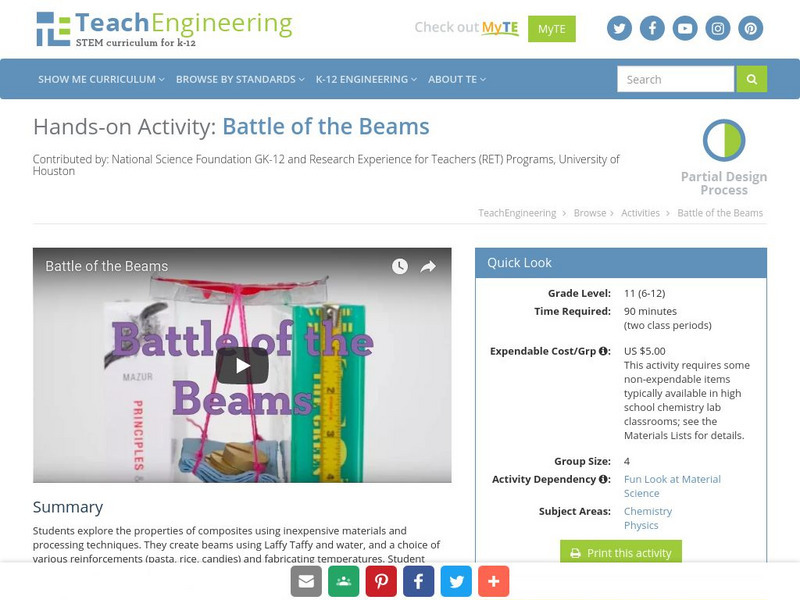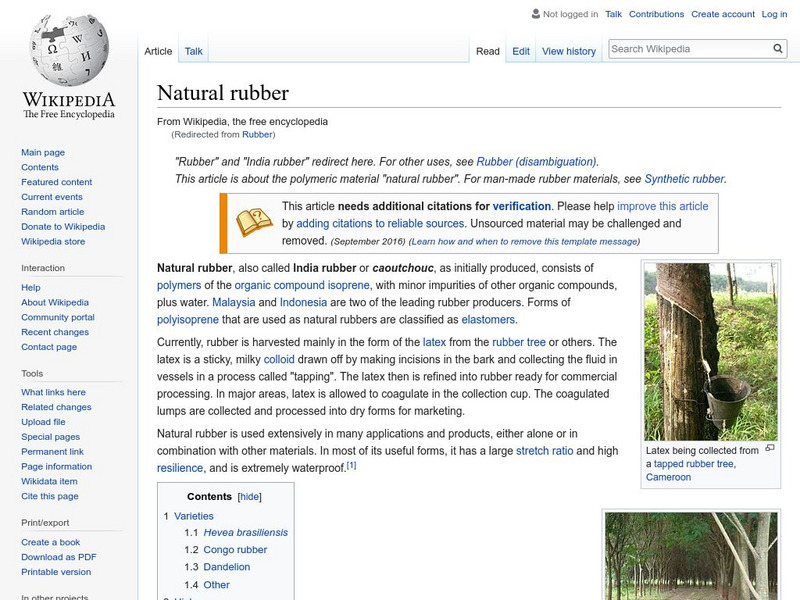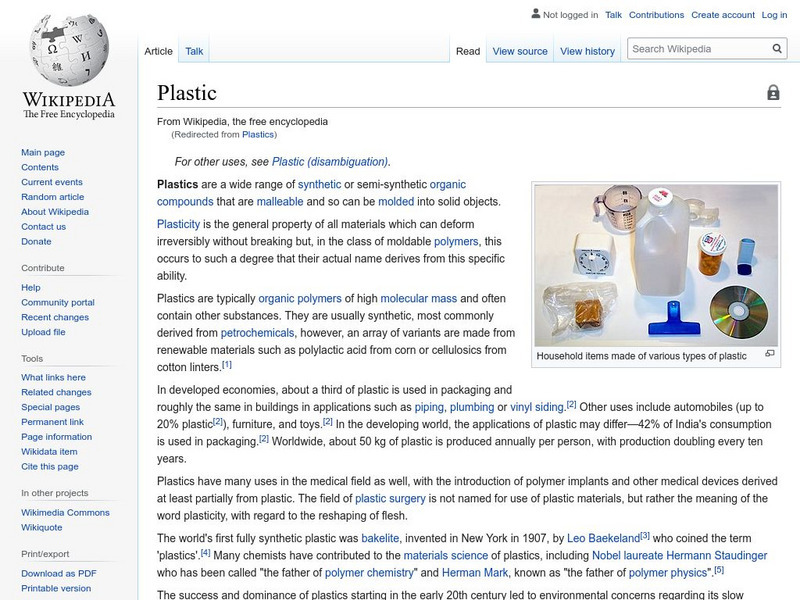TeachEngineering
Teach Engineering: Surfactants: Helping Molecules Get Along
Students learn about the basics of molecules and how they interact with each other. They learn about the idea of polar and non-polar molecules and how they act with other fluids and surfaces. Students acquire a conceptual understanding...
TeachEngineering
Teach Engineering: Battle of the Beams
Students explore the properties of composites using inexpensive materials and processing techniques. They create beams using Laffy Taffy and water, and a choice of various reinforcements (pasta, rice, candies) and fabricating...
Wikimedia
Wikipedia: Nylon
Wikipedia provides detailed information on nylon, a synthetic polymer. Includes nylon's uses, history, and products.
Wikimedia
Wikipedia: Rubber
Wikipedia provides detailed information on rubber, a hydrocarbon polymer. Includes information on the composition and uses of rubber.
Massachusetts Institute of Technology
Mit: Inventor of the Week: Roy J. Plunkett
Read about Roy Plunkett's invention, teflon, one of the best-known and most widely used polymers that was created by accident.
Science Struck
Science Struck: Properties of Polystyrene
Explains what polystyrene is and its many different properties and uses.
Science Struck
Science Struck: Ldpe Plastic
LDPE stands for low-density polyethylene. This resource describes its structure, physical and chemical properties, resistance to various chemicals, advantages and disadvantages, uses, its BPA-free status, and the issue of recycling LDPE...
Wikimedia
Wikipedia: Fuel Cell
A detailed Wikipedia encyclopedia article on fuel cells explains what they are, the controversies in the use of hydrogen as a fuel, and practical problems. There is also a lengthy section on the five generally recognized types of fuel...
Massachusetts Institute of Technology
Mit: Inventor of the Week: Leo Baekeland
Use this site to learn about how Leo Baekeland invented plastic, and how this simple invention resulted in a "plastic revolution."
Other
Doyle Sailmakers: Fiber Guide
Descriptions of the major fibers used in sail making. A decent introduction to the different fibers.
BiologyWise
Biology Wise: How to Make a 3 D Dna Model Project
Describes the steps for how to make a model of DNA using colored polymer clay and wire. Students will gain a good understanding of the structure of DNA by doing this project.
Other
San Diego Plastics, Inc.: Polyethylene
The features, applications, and the fabrication process of high density and low density polyethylenes are listed and described.
Other
Designsite: Polyethylene
Basic information about polyethylene and links to its uses and variations.
Science Fun for Everyone
Science Fun: Squishy Turkeys
Watch Scientist Joe demonstrate how to make a turkey in a glove using homemade slime in this video presentation.
TeachEngineering
Teach Engineering: Preconditioning Balloons
Students use balloons (a polymer) to explore preconditioning a viscoelastic material behavior that is important to understand when designing biomedical devices. They improve their understanding of preconditioning by measuring the force...
TeachEngineering
Teach Engineering: Fun Look at Material Science
Students are introduced to the multidisciplinary field of material science. Through a class demo and PowerPoint presentation, they learn the basic classes of materials (metals, ceramics, polymers, composites) and how they differ from one...
TeachEngineering
Teach Engineering: Breaking Beams
Students learn about stress and strain by designing and building beams using polymer clay. They compete to find the best beam strength to beam weight ratio, and learn about the trade-offs engineers make when designing a structure.
Practical Action
Practical Action: Plastics Challenge
This is a challenge for students to develop solutions to the problems caused by plastic waste globally. They will learn about how plastic waste impacts people around the world, the different types of plastic, how they are each used, how...
Wikimedia
Wikipedia: Plastic
Wikipedia offers all of the basic information one would need about the topic of plastic. Includes hyperlinked table of contents for easy site navigation.
Other
Nanozone Comics: Honey, I Shrunk Myself!
Follow Rachel as she evolves from an interest in solving games and patterns to a career in material science. Watch as she uses nanotechnology to work with polymers. Read about new nanotech devices that can help improve our world in the...
Curated OER
Smithsonian Institution Archives: Jeanne Helen Osiecki (B. 1926)
A native of Switzerland, organic chemist Jeanne Helen Osiecki (b. 1926) had received her Ph.D. from Stanford University in 1960 and began working at Lockheed Missiles and Space Co. in 1961. When this photograph was distributed, Osiecki...


















